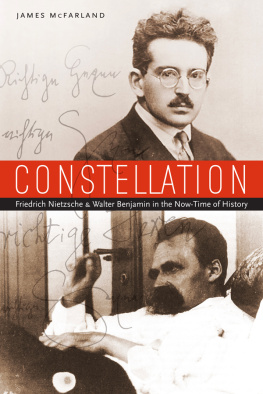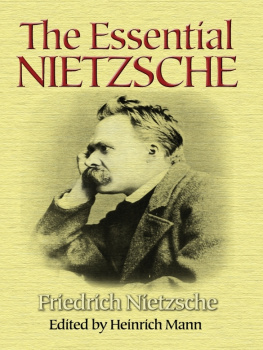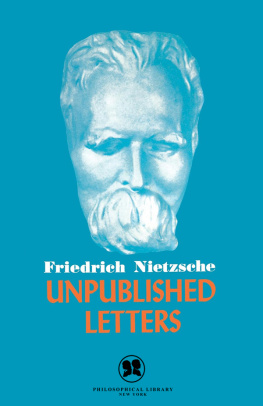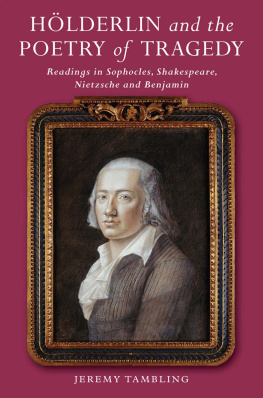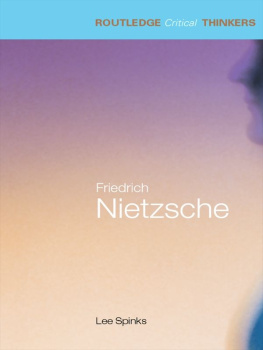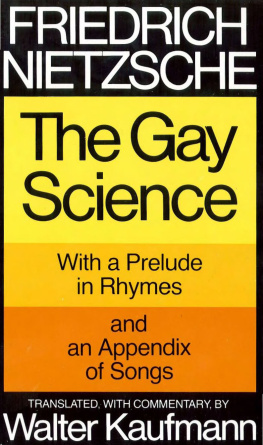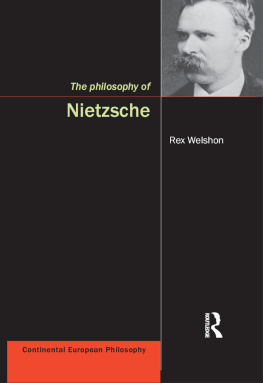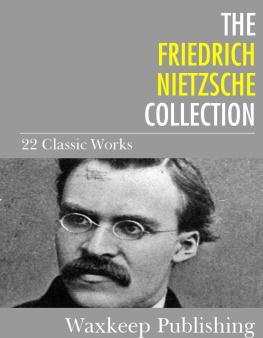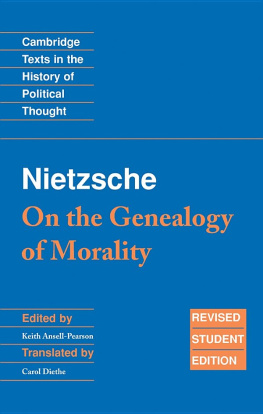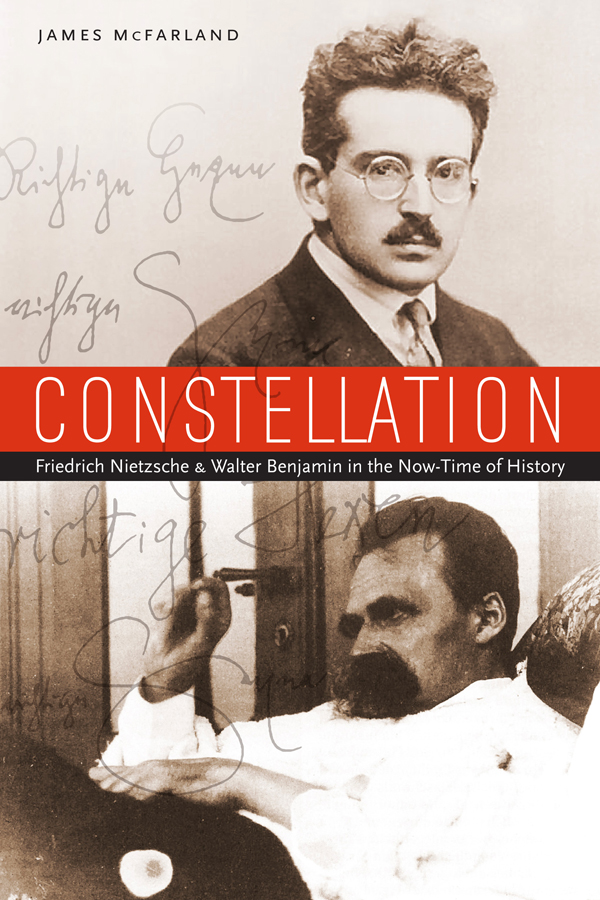This book is made possible by a collaborative grant from the Andrew W. Mellon Foundation.
Copyright 2013 Fordham University Press
All rights reserved. No part of this publication may be reproduced, stored in a retrieval system, or transmitted in any form or by any meanselectronic, mechanical, photocopy, recording, or any otherexcept for brief quotations in printed reviews, without the prior permission of the publisher.
Fordham University Press has no responsibility for the persistence or accuracy of URLs for external or third-party Internet websites referred to in this publication and does not guarantee that any content on such websites is, or will remain, accurate or appropriate.
Fordham University Press also publishes its books in a variety of electronic formats. Some content that appears in print may not be available in electronic books.
Library of Congress Cataloging-in-Publication Data
McFarland, James (Philip James)
Constellation : Friedrich Nietzsche and Walter Benjamin in the now-time of history / James McFarland.
p. cm.
Includes bibliographical references and index.
ISBN 978-0-8232-4536-9 (cloth : alk. paper)
1. Nietzsche, Friedrich Wilhelm, 18441900. 2. Benjamin, Walter, 18921940. I. Title.
B3317.M43 2013
193dc23
2012027017
First edition
Contents
The Trauerspiel therefore knows no hero, only constellations.
Walter Benjamin, The Origin of German Trauerspiel
In his essay A Portrait of Walter Benjamin, reprinted in the collection Prisms, Theodor W. Adorno gestures toward a methodological congruence between the work of his friend Walter Benjamin and the work of the philosopher Friedrich Nietzsche. The later Nietzsches critical insight, Adorno writes, that truth is not identical with a timeless universal, but rather that it is solely the historical which yields the figure of the absolute, became, perhaps without his knowing it, the canon of [Benjamins] practice. Adornos understanding of the relationship between the thought of Nietzsche and Benjamin situates it at a fundamental level of significance, for it holds between an original insight of Nietzsches and the very principle governing Benjamins speculations, the irreducible presence of history in Benjamins thought. At the same time, with his cautious qualification Adorno concedes that the relationship does not have the philological guarantee that would bolster more robust readings. Perhaps Benjamin was hardly aware of this Nietzschean precedent.
An account detailing which of Nietzsches writings Benjamin had read and a characterization of what he had said about those texts and the man who wrote themthis basic philological excavationhad not yet been attempted in 1950 when Adorno offered his comparison. Beyond the dispersed condition of Benjamins writings and the practical difficulties their study presented, the reasons for this lack of interest are not far to seek. In the wake of a genocidal European fascism that had claimed Benjamin as its victim a decade before, the great tension in his thought between Jewish messianism and Communist commitment seemed prima facie to preclude much sympathy for the antidemocratic and atheist Nietzsche who derided both tendencies and who had found such enthusiastic parrots among the Nazi intelligentsia. Though none of Benjamins close survivors could or would take the fascist grotesque of Nietzsches thought seriously, Nietzsches general proximity to reactionary discourses in the twentieth century meant that articulating Benjamins more nuanced attitudes and responses toward him was a project that lacked urgency.
And yet Adornos indication of an affinity at work between Nietzsche and Benjamin was never entirely forgotten. As more of Benjamins writings reached print in subsequent decades and the textual foundation for such philological investigation took shape in the Gesammelte Schriften under the direction of Adornos students Rolf Tiedemann and Hermann Schweppenhuser, it became clear that Adornos qualification of Benjamins familiarity with Nietzsche was hardly necessary. Benjamin knew Nietzsche, early and late. From his juvenilia through his scholarly work to his avant-garde journalism and radio broadcasts in the 1930s, Benjamin consistently oriented his own position with respect to Friedrich Nietzsches, whether he took him to be the avatar of an ardent youth or the diagnostician of mortal tragedy or the exiled wanderer through an anachronistic Europe, witness to the hopeless temporalitynew and always the sameof bourgeois imperialism. Benjamins central treatise The Origin of German Trauerspiel presents itself as the overcoming of Nietzsches Birth of Tragedy; The Arcades Project that orients Benjamins exiled career pulses to the historical rhythm of a Nietzschean Eternal Return. By the 1980s it was clear: In no period of his theoretical career did Benjamin fail to identify a nihilistic limit to his own developing reflections with the views and the example of Nietzsche.
Even as this part of the philological foundation for a comparison of the two writers was setting through the last third of the twentieth century, the significance of Nietzsches philosophy was emerging from the shadow that National Socialism had cast upon it midcentury. The ontological and existential emphases governing interpretations of Nietzsche by Heidegger and Jaspers, conducted in Nazi Germany but at a skeptical remove from official enthusiasm for the Superman, redirected postwar reactions to Nietzsche toward celebration of his commitment to the particular, the accidental, the unrepeatable, and his insubordinate attitude toward received tables of values and their public advocates. Reappraisals of Nietzsches philosophical and political significance outside of Germany in France and Italy, as well as in the United States, gained in self-confidence and interpretive power. Gilles Deleuzes seminal 1962 Nietzsche et la philosophie conveniently dates the renewed sensitivity to the anarchistic political consequences of Nietzsches radically nonconformist example and its incompatibility with totalitarian normativity.
The philological consequences of these reassessments were reflected in the decomposition of Nietzsches putative magnum opus The Will to Power, an amalgam of passages from Nietzsches notebooks arranged without regard to chronology or context by Nietzsches dubious executors Elisabeth Frster-Nietzsche and Heinrich Kselitz, called Peter Gast. The book was less a testament to Nietzsches mature philosophy than a monument to the intellectual pretensions of the Nietzsche Archive, the institution his sister had built to house his mute insanity and publicize his ferocious ideas, pretensions that could not long survive the catastrophes of the twentieth century. After the Second World War new editions of Nietzsches works edited by Karl Schlechta and then by the Italian scholars Giorgio Colli and Mazzino Montinari brought Nietzsches texts up to an academic standard of credibility, rectifying the textual interventions by Nietzsches immediate heirs and restoring the elements of The Will to Power to their original draft positions among the voluminous notebooks Nietzsche obsessively filled with his insights and periods. The result was a Nietzsche much closer to the act of inscription but without the closure of an authoritative culminating statement, a thinker who bears the very possibility of philosophical communication into the yelping silence of his madness.

